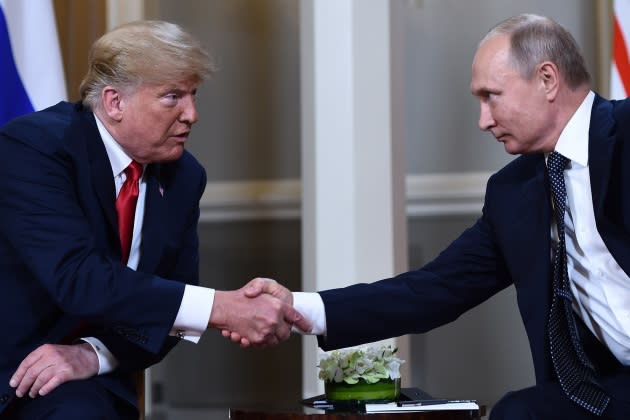Trump Threatened to Out Confidential Sources From Russia Investigation
- Oops!Something went wrong.Please try again later.

Donald Trump in the final days of his presidency repeatedly threatened to out government sources involved in the Trump-Russia investigation, an anti-Deep State revenge fantasy he still obsesses over to this day, according to two former senior Trump aides and another person familiar with the matter.
One of these sources tells Rolling Stone that in the days after the Jan. 6 Capitol riot, the then-president, sometimes while brandishing pieces of paper, would loudly complain that none of the identifying facts in the highly sensitive Russia documents should be blacked-out. Trump would insist, the source says, that it should “all be out there” so that the American people could see the truth of who “did it” to the president.
More from Rolling Stone
Watch Pelosi Plead for Help, Plus 6 Other Big Moments from the Jan. 6 Committee's Last Hearing
Supreme Court Trump Personally Stocked Rejects His Effort to Stymie Mar-a-Lago Probe
Ultimately, top intelligence officials and other Trump lieutenants talked him out of publicizing the sources’ identities before he left the White House, the sources say. Instead, Trump’s team bargained him down to vetting a series of heavily redacted reports that they argued would help safeguard the work and safety of Russia-related informants.
But a third source familiar with the situation says that this obsession with outing the confidential sources is ongoing. The former president, the source says, still sporadically talks about the need to get “the names” out into the public record. A Trump spokesperson did not immediately respond to Rolling Stone’s request for comment.
As Trump faces accusations that he hoarded sensitive classified documents at his private residence in Florida, the last-minute battle over redactions highlights how his disregard for security concerns at times has even rattled aides close to him.
Trump’s threats to out sources were part of a broader push during the chaotic end of his presidency. In December of 2020, as the odds against a successful overturning of the election grew longer, Trump and his chief of staff Mark Meadows pushed the Justice Department to declassify a binder full of records related to the FBI’s 2016 Russia investigation. In his memoir, Meadows described himself in the final hours of the Trump presidency going line by line through the “notes, memos and emails” in the binder to ensure it “would not inadvertently disclose sources and methods.”
With hours left before President Joe Biden took office in Jan. 2021, the White House sent a presidential memo to the Director of National Intelligence, CIA director, and acting Attorney General. The memo ordering the declassification of the binder references concern from the FBI, which stated its “continuing objection to any further declassification” of the binder on the grounds that specific passages “included Intelligence Community equities.” In an apparent nod to the efforts to walk the then-president back from outing “the names,” the memo says his declassification order “does not require the disclosure of certain personally identifiable information.”
The order also exempts from declassification any material that “must be protected from disclosure pursuant to orders of the Foreign Intelligence Surveillance Court,” according to the memo.
At the same time, Trump gave conservative reporter John Solomon access to some of the documents. In a statement to Rolling Stone, Solomon says that on January 19, 2021, Trump allowed him “on two occasions, to briefly review a stack of documents that I was told were the declassified documents” and that he received “a small subset of the declassified documents” from the Justice Department in the mail at the time.
Through his outlet, Just The News, Solomon subsequently reported that the documents included “transcripts of intercepts made by the FBI of Trump aides” and “a declassified copy of the final FISA warrant approved by an intelligence court.” The Justice Department also mailed him a declassified transcript of FBI informant Stefan Halper’s conversations with former Trump campaign advisor Carter Page and notes of an FBI interview with Christopher Steele, the former British intelligence officer who circulated a dossier with allegations about Trump’s relationship with Russia, both of which featured in Solomon stories in 2021.
The binder of materials that Trump obsessed over in the waning days of his presidency was never released in full, but Trump and his allies’ interest in getting access to the records has continued since he left the White House.
Senators Chuck Grassley (R-Iowa) and Ron Johnson (R-Wis.) wrote to the Justice Department earlier this year complaining that the department has “failed to declassify a single page” since Trump issued his memo. In attempting to review the documents, the senators said their staff had spent “multiple days and countless hours in the Department’s classified facility” trying to locate documents purportedly covered by the order as Justice Department officials had “failed to identify” them.
Solomon, appointed as Trump’s designee to the National Archives this summer, says he has continued to seek access to memos from tranche of documents but that the Archives has told him one set is not available in an “easily discernible manner” while another set that remains with the Justice Department awaits “requested Privacy Act redactions.”
Trump, meanwhile, has reportedly continued to seek the release of Russia investigation-related documents. The former president reportedly tried to barter with the National Archives to hand back presidential records held at his Mar-a-Lago residence in exchange for the release of an unspecified batch of documents he believed would reflect poorly on the FBI’s 2016 Russia investigation, according to The New York Times.
Best of Rolling Stone
